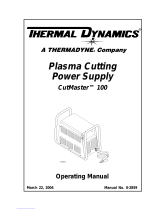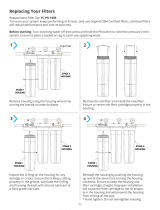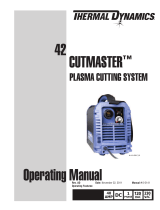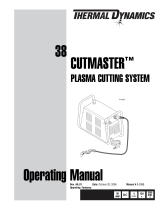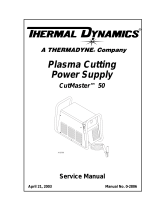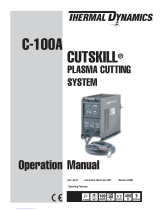Page is loading ...

PLASMA CUTTING SYSTEM
51
CUTMASTER
™
Rev. AA.01 Date: October 20, 2006 Manual # 0-2971
Operating Features:
Art # A-04611
Operating Manual

WE APPRECIATE YOUR BUSINESS!
Congratulations on your new Thermal Dynamics product. We are
proud to have you as our customer and will strive to provide you
with the best service and reliability in the industry. This product is
backed by our extensive warranty and world-wide service network.
To locate your nearest distributor or service agency call 1-800-
426-1888, or visit us on the web at www.thermal-dynamics.com.
This Operating Manual has been designed to instruct you on the
correct use and operation of your Thermal Dynamics product.
Your satisfaction with this product and its safe operation is our
ultimate concern. Therefore please take the time to read the entire
manual, especially the Safety Precautions. They will help you to
avoid potential hazards that may exist when working with this
product.
YOU ARE IN GOOD COMPANY!
The Brand of Choice for Contractors and Fabricators Worldwide.
Thermal Dynamics is a Global Brand of manual and automation
Plasma Cutting Products for Thermadyne Industries Inc.
We distinguish ourselves from our competition through market-
leading, dependable products that have stood the test of time.
We pride ourselves on technical innovation, competitive prices,
excellent delivery, superior customer service and technical
support, together with excellence in sales and marketing expertise.
Above all, we are committed to developing technologically
advanced products to achieve a safer working environment within
the welding industry.

WARNINGS
Read and understand this entire Manual and your employer’s safety practices before installing, operat-
ing, or servicing the equipment.
While the information contained in this Manual represents the Manufacturer's best judgement, the
Manufacturer assumes no liability for its use.
Plasma Cutting Power Supply
CutMaster™ 51
Operating Manual Number 0-2971
Covered under U.S. Patents.
Published by:
Thermal Dynamics Corporation
82 Benning Street
West Lebanon, New Hampshire, USA 03784
(603) 298-5711
www.thermal-dynamics.com
Copyright 2003, 2004, 2005, 2006 by
Thermal Dynamics Corporation
All rights reserved.
Reproduction of this work, in whole or in part, without written permission of the pub-
lisher is prohibited.
The publisher does not assume and hereby disclaims any liability to any party for any
loss or damage caused by any error or omission in this Manual, whether such error
results from negligence, accident, or any other cause.
Printed in the United States of America
Publication Date: October 20, 2006
Record the following information for Warranty purposes:
Where Purchased:____________________________________
Purchase Date:_______________________________________
Power Supply Serial #:________________________________
Torch Serial #:________________________________________

TABLE OF CONTENTS
SECTION 1:
GENERAL INFORMATION ................................................................................................ 1-1
1.01 Notes, Cautions and Warnings ...................................................................... 1-1
1.02 Important Safety Precautions ....................................................................... 1-1
1.03 Publications .................................................................................................. 1-2
1.04 Declaration of Conformity ............................................................................. 1-4
1.05 Statement of Warranty .................................................................................. 1-5
SECTION 2:
INTRODUCTION ............................................................................................................... 2-1
2.01 Scope of Manual .......................................................................................... 2-1
2.02 Power Supply Specifications......................................................................... 2-1
2.03 Input Wiring Specifications ........................................................................... 2-2
2.04 Power Supply Features ................................................................................. 2-3
2.05 Power Supply Options and Accessories ....................................................... 2-4
SECTION 3:
INSTALLATION .................................................................................................................. 3-1
3.01 Unpacking .................................................................................................... 3-1
3.02 Lifting Options .............................................................................................. 3-1
3.03 Primary Input Power Connections ................................................................. 3-2
3.04 Gas Connections .......................................................................................... 3-4
3.05 Torch Connections ........................................................................................ 3-8
SECTION 4:
OPERATION ...................................................................................................................... 4-1
4.01 Front Panel Controls and Indicators .............................................................. 4-1
4.02 Preparations for Operation ............................................................................ 4-2
SECTION 5:
SERVICE .......................................................................................................................... 5-1
5.01 General Maintenance .................................................................................... 5-1
5.02 Common Faults ............................................................................................ 5-5
5.03 Basic Troubleshooting Guide ......................................................................... 5-6
5.04 Power Supply Basic Parts Replacement ...................................................... 5-11

TABLE OF CONTENTS (continued)
SECTION 6:
PARTS LISTS ................................................................................................................... 6-1
6.01 Introduction ................................................................................................... 6-1
6.02 Ordering Information ..................................................................................... 6-1
6.03 Power Supply Replacement .......................................................................... 6-1
6.04 Replacement Parts ....................................................................................... 6-2
6.05 Options and Accessories .............................................................................. 6-2
6.06 Torch Parts ................................................................................................... 6-3
PATENT INFORMATION ............................................................................................................ 6-4
APPENDIX 1: SEQUENCE OF OPERATION
(BLOCK DIAGRAM) .......................................................................................................... A-1
APPENDIX 2: DATA TAG INFORMATION .................................................................................. A-2
APPENDIX 3: MAINTENANCE SCHEDULE ............................................................................. A-3
APPENDIX 4: TORCH PIN - OUT DIAGRAMS .......................................................................... A-4
APPENDIX 5: TORCH CONNECTION DIAGRAMS ................................................................... A-5
APPENDIX 6: SYSTEM SCHEMATIC, 208/230V UNITS .......................................................... A-6
APPENDIX 7: SYSTEM SCHEMATIC, 400V & 460V UNITS ................................................... A-8
APPENDIX 8: Publication History ........................................................................................... A-10
Global Customer Service Contact Information ..................................................... Inside Rear Cover


Manual 0-2971 1-1 GENERAL INFORMATION
SECTION 1:
GENERAL INFORMATION
1.01 Notes, Cautions and Warnings
Throughout this manual, notes, cautions, and warnings
are used to highlight important information. These high-
lights are categorized as follows:
NOTE
An operation, procedure, or background informa-
tion which requires additional emphasis or is help-
ful in efficient operation of the system.
CAUTION
A procedure which, if not properly followed, may
cause damage to the equipment.
WARNING
A procedure which, if not properly followed, may
cause injury to the operator or others in the oper-
ating area.
1.02 Important Safety Precautions
WARNINGS
OPERATION AND MAINTENANCE OF
PLASMA ARC EQUIPMENT CAN BE DAN-
GEROUS AND HAZARDOUS TO YOUR
HEALTH.
Plasma arc cutting produces intense electric and
magnetic emissions that may interfere with the
proper function of cardiac pacemakers, hearing aids,
or other electronic health equipment. Persons who
work near plasma arc cutting applications should
consult their medical health professional and the
manufacturer of the health equipment to determine
whether a hazard exists.
To prevent possible injury, read, understand and
follow all warnings, safety precautions and instruc-
tions before using the equipment. Call 1-603-298-
5711 or your local distributor if you have any ques-
tions.
GASES AND FUMES
Gases and fumes produced during the plasma cutting
process can be dangerous and hazardous to your health.
• Keep all fumes and gases from the breathing area.
Keep your head out of the welding fume plume.
• Use an air-supplied respirator if ventilation is not
adequate to remove all fumes and gases.
• The kinds of fumes and gases from the plasma arc
depend on the kind of metal being used, coatings
on the metal, and the different processes. You must
be very careful when cutting or welding any met-
als which may contain one or more of the follow-
ing:
Antimony Chromium Mercury
Arsenic Cobalt Nickel
Barium Copper Selenium
Beryllium Lead Silver
Cadmium Manganese Vanadium
• Always read the Material Safety Data Sheets
(MSDS) that should be supplied with the material
you are using. These MSDSs will give you the in-
formation regarding the kind and amount of fumes
and gases that may be dangerous to your health.
• For information on how to test for fumes and gases
in your workplace, refer to item 1 in Subsection 1.03,
Publications in this manual.
• Use special equipment, such as water or down draft
cutting tables, to capture fumes and gases.
• Do not use the plasma torch in an area where com-
bustible or explosive gases or materials are located.
• Phosgene, a toxic gas, is generated from the vapors
of chlorinated solvents and cleansers. Remove all
sources of these vapors.
• This product, when used for welding or cutting, pro-
duces fumes or gases which contain chemicals
known to the State of California to cause birth de-
fects and, in some cases, cancer. (California Health
& Safety Code Sec. 25249.5 et seq.)
ELECTRIC SHOCK
Electric Shock can injure or kill. The plasma arc process
uses and produces high voltage electrical energy. This
electric energy can cause severe or fatal shock to the op-
erator or others in the workplace.
• Never touch any parts that are electrically “live” or
“hot.”

GENERAL INFORMATION 1-2 Manual 0-2971
• Wear dry gloves and clothing. Insulate yourself
from the work piece or other parts of the welding
circuit.
• Repair or replace all worn or damaged parts.
• Extra care must be taken when the workplace is
moist or damp.
• Install and maintain equipment according to NEC
code, refer to item 9 in Subsection 1.03, Publications.
• Disconnect power source before performing any ser-
vice or repairs.
• Read and follow all the instructions in the Operat-
ing Manual.
FIRE AND EXPLOSION
Fire and explosion can be caused by hot slag, sparks, or
the plasma arc.
• Be sure there is no combustible or flammable mate-
rial in the workplace. Any material that cannot be
removed must be protected.
• Ventilate all flammable or explosive vapors from
the workplace.
• Do not cut or weld on containers that may have held
combustibles.
• Provide a fire watch when working in an area where
fire hazards may exist.
• Hydrogen gas may be formed and trapped under
aluminum workpieces when they are cut underwa-
ter or while using a water table. DO NOT cut alu-
minum alloys underwater or on a water table un-
less the hydrogen gas can be eliminated or
dissipated. Trapped hydrogen gas that is ignited
will cause an explosion.
NOISE
Noise can cause permanent hearing loss. Plasma arc pro-
cesses can cause noise levels to exceed safe limits. You
must protect your ears from loud noise to prevent per-
manent loss of hearing.
• To protect your hearing from loud noise, wear pro-
tective ear plugs and/or ear muffs. Protect others
in the workplace.
• Noise levels should be measured to be sure the deci-
bels (sound) do not exceed safe levels.
• For information on how to test for noise, see item 1
in Subsection 1.03, Publications, in this manual.
PLASMA ARC RAYS
Plasma Arc Rays can injure your eyes and burn your skin.
The plasma arc process produces very bright ultra violet
and infra red light. These arc rays will damage your eyes
and burn your skin if you are not properly protected.
• To protect your eyes, always wear a welding hel-
met or shield. Also always wear safety glasses with
side shields, goggles or other protective eye wear.
• Wear welding gloves and suitable clothing to pro-
tect your skin from the arc rays and sparks.
• Keep helmet and safety glasses in good condition.
Replace lenses when cracked, chipped or dirty.
• Protect others in the work area from the arc rays.
Use protective booths, screens or shields.
• Use the shade of lens as suggested in the following
per ANSI/ASC Z49.1:
Minimum Protective Suggested
Arc Current Shade No. Shade No.
Less Than 300* 8 9
300 - 400* 9 12
400 - 800* 10 14
* These values apply where the actual arc is clearly
seen. Experience has shown that lighter filters may
be used when the arc is hidden by the workpiece.
1.03 Publications
Refer to the following standards or their latest revisions
for more information:
1. OSHA, SAFETY AND HEALTH STANDARDS, 29CFR
1910, obtainable from the Superintendent of Documents,
U.S. Government Printing Office, Washington, D.C.
20402
2. ANSI Standard Z49.1, SAFETY IN WELDING AND
CUTTING, obtainable from the American Welding So-
ciety, 550 N.W. LeJeune Rd, Miami, FL 33126
3. NIOSH, SAFETY AND HEALTH IN ARC WELDING
AND GAS WELDING AND CUTTING, obtainable from
the Superintendent of Documents, U.S. Government
Printing Office, Washington, D.C. 20402
4. ANSI Standard Z87.1, SAFE PRACTICES FOR OCCU-
PATION AND EDUCATIONAL EYE AND FACE PRO-
TECTION, obtainable from American National Stan-
dards Institute, 1430 Broadway, New York, NY 10018
5. ANSI Standard Z41.1, STANDARD FOR MEN’S
SAFETY-TOE FOOTWEAR, obtainable from the Ameri-
can National Standards Institute, 1430 Broadway, New
York, NY 10018

Manual 0-2971 1-3 GENERAL INFORMATION
6. ANSI Standard Z49.2, FIRE PREVENTION IN THE USE
OF CUTTING AND WELDING PROCESSES, obtain-
able from American National Standards Institute, 1430
Broadway, New York, NY 10018
7. AWS Standard A6.0, WELDING AND CUTTING
CONTAINERS WHICH HAVE HELD COMBUS-
TIBLES, obtainable from American Welding Society,
550 N.W. LeJeune Rd, Miami, FL 33126
8. NFPA Standard 51, OXYGEN-FUEL GAS SYSTEMS
FOR WELDING, CUTTING AND ALLIED PRO-
CESSES, obtainable from the National Fire Protection
Association, Batterymarch Park, Quincy, MA 02269
9. NFPA Standard 70, NATIONAL ELECTRICAL CODE,
obtainable from the National Fire Protection Associa-
tion, Batterymarch Park, Quincy, MA 02269
10. NFPA Standard 51B, CUTTING AND WELDING PRO-
CESSES, obtainable from the National Fire Protection
Association, Batterymarch Park, Quincy, MA 02269
11. CGA Pamphlet P-1, SAFE HANDLING OF COM-
PRESSED GASES IN CYLINDERS, obtainable from the
Compressed Gas Association, 1235 Jefferson Davis
Highway, Suite 501, Arlington, VA 22202
12. CSA Standard W117.2, CODE FOR SAFETY IN WELD-
ING AND CUTTING, obtainable from the Canadian
Standards Association, Standards Sales, 178 Rexdale
Boulevard, Rexdale, Ontario, Canada M9W 1R3
13. NWSA booklet, WELDING SAFETY BIBLIOGRAPHY
obtainable from the National Welding Supply Associa-
tion, 1900 Arch Street, Philadelphia, PA 19103
14. American Welding Society Standard AWSF4.1, RECOM-
MENDED SAFE PRACTICES FOR THE PREPARA-
TION FOR WELDING AND CUTTING OF CONTAIN-
ERS AND PIPING THAT HAVE HELD HAZARDOUS
SUBSTANCES, obtainable from the American Welding
Society, 550 N.W. LeJeune Rd, Miami, FL 33126
15. ANSI Standard Z88.2, PRACTICE FOR RESPIRATORY
PROTECTION, obtainable from American National
Standards Institute, 1430 Broadway, New York, NY
10018

GENERAL INFORMATION 1-4 Manual 0-2971
1.04 Declaration of Conformity
Manufacturer: Thermal Dynamics Corporation
Address: 82 Benning Street
West Lebanon, New Hampshire 03784
USA
The equipment described in this manual conforms to all applicable aspects and regulations of the ‘Low Voltage Directive’
(European Council Directive 73/23/EEC as amended by Council Directive 93/68/EEC) and to the National legislation for
the enforcement of this Directive.
Serial numbers are unique with each individual piece of equipment and details description, parts used to manufacture a unit
and date of manufacture.
National Standard and Technical Specifications
The product is designed and manufactured to a number of standards and technical requirements. Among them are:
* CSA (Canadian Standards Association) standard C22.2 number 60 for Arc welding equipment.
* UL (Underwriters Laboratory) rating 94VO flammability testing for all printed-circuit boards used.
* ISO/IEC 60974-1 (BS 638-PT10) (EN 60 974-1) (EN50192) (EN50078) applicable to plasma cutting equipment and associ-
ated accessories.
* Extensive product design verification is conducted at the manufacturing facility as part of the routine design and manufac-
turing process. This is to ensure the product is safe, when used according to instructions in this manual and related
industry standards, and performs as specified. Rigorous testing is incorporated into the manufacturing process to ensure
the manufactured product meets or exceeds all design specifications.
Thermal Dynamics has been manufacturing products for more than 30 years, and will continue to achieve excellence in our
area of manufacture.
Manufacturers responsible representative: Giorgio Bassi
Managing Director
Thermal Dynamics Europe
Via rio Fabbiani 8A
40067 Rastignano (BO)
Italy

Manual 0-2971 1-5 GENERAL INFORMATION
1.05 Statement of Warranty
LIMITED WARRANTY: Subject to the terms and conditions established below, Thermal Dynamics
®
Corporation warrants to the
original retail purchaser that new Thermal Dynamics CUTMASTER™ 1Series plasma cutting systems sold after the effective date of this
warranty are free of defects in material and workmanship. Should any failure to conform to this warranty appear within the applicable
period stated below, Thermal Dynamics Corporation shall, upon notification thereof and substantiation that the product has been stored
operated and maintained in accordance with Thermal Dynamics’ specifications, instructions, recommendations and recognized industry
practice, correct such defects by suitable repair or replacement.
This warranty is exclusive and in lieu of any warranty of merchantability or fitness for a particular purpose.
Thermal Dynamics will repair or replace, at its discretion, any warranted parts or components that fail due to defects in material or
workmanship within the time periods set out below. Thermal Dynamics Corporation must be notified within 30 days of any failure, at
which time Thermal Dynamics Corporation will provide instructions on the warranty procedures to be implemented.
Thermal Dynamics Corporation will honor warranty claims submitted within the warranty periods listed below. All warranty periods
begin on the date of sale of the product to the original retail customer or 1 year after sale to an authorized Thermal Dynamics Distributor.
LIMITED WARRANTY PERIOD
Product
Power Supply Components
(Parts and Labor)
Torch and Leads
(Parts and Labor)
CUTMASTER™ 38 3 Years 1 Year
CUTMASTER™ 51 3 Years 1 Year
CUTMASTER™ 81 3 Years 1 Year
CUTMASTER™ 101 3 Years 1 Year
This warranty does not apply to:
1. Consumable Parts, such as tips, electrodes, shield cups, o - rings, starter cartridges, gas distributors, fuses, filters.
2. Equipment that has been modified by an unauthorized party, improperly installed, improperly operated or misused based upon
industry standards.
In the event of a claim under this warranty, the remedies shall be, at the discretion of Thermal Dynamics Corporation:
1. Repair of the defective product.
2. Replacement of the defective product.
3. Reimbursement of reasonable costs of repair when authorized in advance by Thermal Dynamics.
4. Payment of credit up to the purchase price less reasonable depreciation based on actual use.
These remedies may be authorized by Thermal Dynamics and are FOB West Lebanon, NH or an authorized Thermadyne service station. Product
returned for service is at the owner’s expense and no reimbursement of travel or transportation is authorized.
LIMITATION OF LIABILITY: Thermal Dynamics Corporation shall not under any circumstances be liable for special or consequential damages
such as, but not limited to, damage or loss of purchased or replacement goods or claims of customer of distributors (hereinafter “Purchaser”) for
service interruption. The remedies of the Purchaser set forth herein are exclusive and the liability of Thermal Dynamics with respect to any contract,
or anything done in connection therewith such as the performance or breach thereof, or from the manufacture, sale, delivery, resale, or use of the
goods covered by or furnished by Thermal Dynamics whether arising out of contract, negligence, strict tort, or under any warranty, or otherwise, shall
not, except as expressly provided herein, exceed the price of the goods upon which liability is based.
This warranty becomes invalid if replacement parts or accessories are used which may impair the safety or performance of any
Thermal Dynamics product.
This warranty is invalid if the Thermal Dynamics product is sold by non - authorized persons.
Effective January 15, 2004

GENERAL INFORMATION 1-6 Manual 0-2971

Manual 0-2971 2-1 INTRODUCTION
SECTION 2:
INTRODUCTION
2.01 Scope of Manual
This manual contains descriptions, operating instructions and basic maintenance procedures for the Thermal Dy-
namics CutMaster 51 Plasma Cutting Power Supply only. Servicing of this equipment is restricted to properly
trained personnel; unqualified personnel are strictly cautioned against attempting repairs or adjustments not cov-
ered in this manual, at the risk of voiding the Warranty.
Read this manual thoroughly. A complete understanding of the characteristics and capabilities of this equipment
will assure the dependable operation for which it was designed.
NOTE
Refer to the Torch Manual for torch and cutting information.
2.02 Power Supply Specifications
Input Power Cable
Output Current
Power Supply Gas
Filtering Ability
Ambient Temperature
IEC
Rating
TDC
Rating
IEC
Rating
TDC
Rating
IEC
Rating
TDC
Rating
Duty Cycle
Current
40 Amps n/a 25 Amps n/a n/a n/a
DC Voltage
96 vdc n/a 90 vdc n/a n/a n/a
20 - 40 Amps, Continuously Adjustable
Particulates to 20 Microns
CutMaster 51 Power Supply Duty Cycle *
400 VAC (360 - 440 VAC), Three Phase, 50/60 Hz
460 VAC (414 - 506 VAC), Single Phase, 60 Hz
460 VAC (414 - 506 VAC), Three Phase, 60 Hz
Power Supply includes input cable.
Cable for 208/230V input power includes molded plug.
* NOTE: The duty cycle will be reduced if the primary input power (AC) is lo
w
or the output voltage (DC) is higher than shown in this chart.
Input Power
CutMaster 51 Power Supply Specifications
All Units
40% 60% 100%
40° C (104° F)
208 / 230 VAC (187 - 253 VAC), Single Phase, 60 Hz
NOTE:
IEC Rating is determined as specified by the International Electro-Technical Commission. These specifications
include calculating an output voltage based upon power supply rated current. To facilitate comparison between
power supplies, all manufacturers use this output voltage to determine duty cycle.
TDC Rating is determined using an output voltage representative of actual output voltage during cutting with a
TDC torch. This voltage may be more or less than IEC voltage, depending upon choice of torch, consumables, and
actual cutting operation.

INTRODUCTION 2-2 Manual 0-2971
Power Supply Dimensions & Weight Ventilation Clearance Requirements
22.5"
0.57 m
58 lb / 26 kg
10.75"
273 mm
16.375"
416 mm
Art # A-04612
Art # A-03379
6"
150 mm
24"
0.6 m
6"
150 mm
6"
150 mm
2.03 Input Wiring Specifications
Voltage Freq. 1-Ph 3-Ph 1-Ph 3-Ph
(Volts) (Hz.) (kVA) (kVA) (Amps) (Amps) 1-Ph 3-Ph 1-Ph 3-Ph 1-Ph 3-Ph
208609 42601010
230609 37601010
40050 8 11151212
400 60 8.5 12 15 12 12
460 60 14 17.5 25 12 12
46060 8 10151212
Fuse (Amps) Wire (AWG) Wire (Canada)
Line Voltages with Suggested Circuit Protection and Wire Sizes
Based on National Electric Code and Canadian Electric Code
CutMaster 51 Power Supply Input Wiring Requirements
Input Power Input Current Input Suggested Sizes (See Notes)
NOTES
Refer to Local and National Codes or local authority having jurisdiction for proper wiring requirements.
Cable size is de-rated based on the Duty Cycle of the equipment.
The suggested sizes are based on flexible power cable with power plug installations. For hard-wired installations
refer to local or national codes.
Cable conductor temperature used is 167° F (75° C).
An energy limiting fuse UL Class RK-1 (examples: BUSS LPS / LPN-RK or Gould-Shawmut AZK-A6K) should be
used to minimize damage to Plasma Cutting, Welding or power distribution equipment.
NEVER use replaceable element fuses like UL Class H, or "one-time" fuses like UL Class K5.

Manual 0-2971 2-3 INTRODUCTION
2.04 Power Supply Features
Art # A-04613
Work Cable
and Clamp
Handle and Leads Wrap
Torch Leads Receptacle
Control Panel
Art # A-03738
Input Power Cord
Ports for Optional Automation
Interface Cable
Gas Inlet Port
Gas Pressure Regulator /
Filter Assembly
Gas Pressure Gauge

INTRODUCTION 2-4 Manual 0-2971
2.05 Power Supply Options and Accessories
Section 6, Parts Lists, provides catalog numbers and ordering information.
A. Single-Stage Air Filter Kit
For use with compressed air shop systems. Filters moisture and particulate matter from the air stream to at least 0.85 microns.
B. Two Stage Air Filter Kit
For use on compressed air shop systems. Filters moisture and particulate matter from the air stream to at least 5.0 microns.
C. High Pressure Regulators
High pressure regulators are available. The regulators are used to set the proper pressure for the type gas being used.
NOTE
Regulators should not be installed with In-Line Air Filters.
D. Extended Work Cable with Clamp
As an alternative to the standard 20 ft / 6.1 m work cable & clamp on the power supply, a 50 ft / 15.2 m work cable with clamp
is available.
E. Multi-Purpose Cart
Rugged steel cart on easy-rolling rear wheels and front-mounted swivel casters. Provides maximum mobility for the power
supply and can also serve as a display cart. Top shelf is 12" / 305 mm x 20" / 508 mm. Steel handle is 30" / 762 mm high.
F. Wheel Kit
A kit with easy - rolling wheels, for maximum portability for the power supply.
F. Automation Interface Kit
This kit allows the user to convert a non automated power supply for use as part of a fully automated system.
The kit includes an automation interface board, wiring harness, mounting hardware and instructions. The auto-
mation interface provides the basic start / stop and OK to move functions, and a switch selectable voltage
divider output. An external connector simplifies the connection to a CNC type cutting machine. CNC cables are
available in 25' / 7.6 m and 50' / 15.m lengths for use with this kit.
G. Nylon Dust Cover
Nylon canvas power supply dust cover with water resistant finish, large outer pocket for storing manuals or spare consum-
ables, and adjustable draw cord for tight fit.

Manual 0-2971 3-1 INSTALLATION
SECTION 3:
INSTALLATION
3.01 Unpacking
1. Use the packing lists to identify and account for each item.
2. Inspect each item for possible shipping damage. If damage is evident, contact your distributor and / or shipping
company before proceeding with the installation.
3. Record Power Supply and Torch model and serial numbers, purchase date and vendor name, in the information
block at the front of this manual.
3.02 Lifting Options
The Power Supply includes a handle for hand lifting only. Be sure unit is lifted and transported safely and securely.
WARNINGS
Do not touch live electrical parts.
Disconnect input power cord before moving unit.
FALLING EQUIPMENT can cause serious personal injury and can damage equipment.
HANDLE is not for mechanical lifting.
• Only persons of adequate physical strength should lift the unit.
• Lift unit by the handle, using two hands. Do not use straps for lifting.
• Use optional cart or similar device of adequate capacity to move unit.
• Place unit on a proper skid and secure in place before transporting with a fork lift or other vehicle.

INSTALLATION 3-2 Manual 0-2971
3.03 Primary Input Power Connections
CAUTION
Check your power source for correct voltage before plugging in or connecting the unit. The primary power source,
fuse, and any extension cords used must conform to local electrical code and the recommended circuit protection and
wiring requirements as specified in Section 2.03.
A. Connections to 208 / 230 - Volt Power
The 208 / 230 - Volt power supply includes a factory - installed input power cable and plug.
1. Check your power source for correct voltage before plugging in the unit.
2. Connect the input power cable (or close the main disconnect switch) to supply power to the system.
CAUTION
The primary power source and power cable must conform to local electrical code and the recommended circuit
protection and wiring requirements (refer to table in Section 2).
B. Connections to 400 - Volt, or 460 - Volt Three - Phase Power
These Power Supplies are equipped with a four - conductor input power cable for three - phase input power. The
460 - Volt Power Supply will accept 460 - VAC, Single - Phase input power with a change of input power cable.
1. The input cable's outer covering is stripped back at the factory to expose the individual wires at the free end
of the cable.
2. Connect the ends of the individual wires to a customer supplied plug or main disconnect as follows:
CAUTION
The primary power source and power cable must conform to local electrical code and the recommended circuit
protection and wiring requirements (refer to table in Section 2 ). All the input cable wires must be connected for three
- phase operation.
• Green / Yellow wire to Ground.
• Remaining wires to L1, L2, L3 input.
3. Connect the input power cable (or close the main disconnect switch) to supply power to the system.

Manual 0-2971 3-3 INSTALLATION
C. Connections to 460 - Volt Single- Phase Power
The 460 - Volt Power Supply will accept 460 - VAC, Single - Phase input power with a change of input power cable.
1. Remove the Power Supply cover per section 5.04.
2. Disconnect the original input power cable from the main input contactor and the chassis ground connection.
3. Loosen the through - hole protector on the back panel of the power supply. Pull the original power cable out
of the power supply.
4. Pass a customer - supplied, three - conductor input power cable through the access opening in the back panel
of the power supply. Refer to Section 2 for power cable specifications. Tighten the through - hole protector to
secure the power cable.
CAUTION
The primary power source and power cable must conform to local electrical code and the recommended circuit
protection and wiring requirements (refer to table in Section 2).
5. Strip back the insulation on the individual wires.
6. Connect to main input contactor as follows:
• Line 1 wire to terminal L1.
• Line 3 wire to terminal L3.
7. Connect the ground wire to Ground (Earth). The Ground wire connection requires a ring terminal.
A-03041
L1
L3
Ground Wire
with Ring
Terminal
Main Input
Contactor
Input Cable
L1 L2 L3
Input Power Connections, 460 VAC, Single - Phase
8. Reinstall the Power Supply cover.
9. Connect the input power cable (or close the main disconnect switch) to supply power to the system.

INSTALLATION 3-4 Manual 0-2971
3.04 Gas Connections
A. Connecting Gas Supply to Unit
The connection is the same for compressed air or high pressure cylinders. Refer to subsection 3.4-B or 3.4-C if an
optional air line filter is to be installed.
1. Connect the air line to the inlet port. The illustration shows typical fittings as an example.
NOTE
For a secure seal, apply thread sealant to the fitting threads, according to manufacturer's instructions. Do not use
Teflon tape as a thread sealer, as small particles of the tape may break off and block the small air passages in the torch.
Art # A-02999
Hose Clamp
1/4 NPT to 1/4"
(6mm) Fitting
Regulator/Filter
Assembly
Inlet Port
Gas Supply
Hose
Bowl
Air Connection to Inlet Port
/
